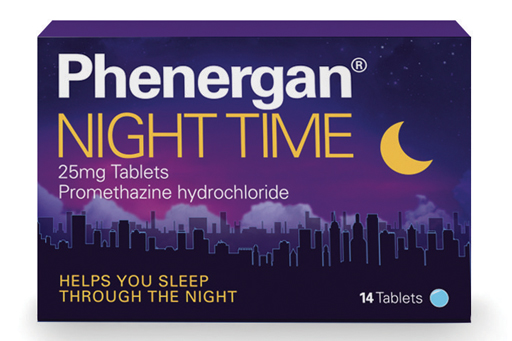In consultation: Treatment of short-term insomnia
In Sponsored education
Follow this topic
Bookmark
Record learning outcomes
This consultation will help you to understand the causes and symptoms of short-term insomnia, and how to treat it. In this scenario, a lady in her 40s is having trouble sleeping

One of your customers ask for your help; she tells you she has had trouble sleeping and you can see she looks tired and anxious.
Pharmacy assistant:
Good morning, how can I help you?
Customer:
I’ve had trouble sleeping for the past few nights – I’m so tired, and now I’m worried I won’t get to sleep again tonight. Getting to sleep and staying asleep is the trouble. I’m probably only getting a maximum of five hours.
Pharmacy assistant:
Is there anything you think of that could be contributing to this?
Customer:
I’ve had a lot going on at work as I’m dealing with a major project so I think that’s the problem. My mind is constantly racing at night as I try to get to sleep.
Pharmacy assistant:
There are a variety of causes of insomnia, including environmental factors, physical health, stress and anxiety, as well as lifestyle factors. It sounds like you are very busy with work so perhaps the stress and anxiety is impacting on your sleep pattern.
Customer:
Yes, I think you’re right. Is that normal?
Pharmacy assistant:
Yes, insomnia is quite common, around one in three people suffer from it,1 but you did the right thing by asking for help as I can recommend something that will enable you to sleep through the night which will help break the cycle of poor sleep.
Customer:
That sounds great, thank you.
Pharmacy assistant:
I need to ask you a few questions to make sure that it is suitable for you. Have you tried any lifestyle changes? Do you have any medical conditions?
Customer:
I’ve tried to develop a bit of a bedtime routine but it doesn’t seem to help. I don’t have any medical conditions.*
Pharmacy assistant:
OK. Well five hours is a lot less sleep than you should be getting each night, you should consider some lifestyle changes, such as reducing your caffiene intake, or stopping smoking.2 To help with the immediate problem, use Phenergan Night Time. It contains promethazine hydrochloride which is a sedating antihistamine. It will help you feel more relaxed and help you get to sleep.
Customer:
How does that work?
Pharmacy assistant:
Histamine occurs naturally within the body and is involved in many processes, including the circadian rhythm, which affects our sleep-wake cycle. When we are awake, there are raised levels of histamine – promethazine blocks this action of histamine on the brain creating a sedative effect to help people get the sleep they need.3,4,5
Customer:
How many should I take?
Pharmacy assistant:
You can take one 25mg tablet of Phenergan Night Time at night, if needed you can take two tablets but you should start and stick to the lowest effective dose. If the problem persists for more than seven days, you should see your GP, as it is only used for short-term insomnia.6 The Phenergan Night Time patient leaflet also has some very useful information.
Customer:
Thank you for your time. I hope that a combination of Phenergan Night Time and the useful advice you have provided will help. I’ll let you know how I get on.
* If the customer does have a medical condition, you may need to refer them to the pharmacist and consult the product information.
Behind the consultation: supporting information from the pharmacist
Small changes that can help improve sleep:7,8
 Keep to a bedtime routine: go to bed and get up at the same time every day, seven days a week. The customer should choose a time when she is likely to feel tired, and even if she hasn’t had enough sleep, get up at the same time every day. She should also avoid daytime napping
Keep to a bedtime routine: go to bed and get up at the same time every day, seven days a week. The customer should choose a time when she is likely to feel tired, and even if she hasn’t had enough sleep, get up at the same time every day. She should also avoid daytime napping- Take daily exercise: this could be 30 minutes of cycling or running. However, the customer should avoid vigorous exercise, such as running or the gym, too close to bedtime, as it may keep her awake
- Relax at least one hour before bed: consider a bedtime routine, such as a relaxing bath, listening to soft music, or reading a book
- Create a restful sleeping environment: ensure the bedroom is dark and quiet and the bed is comfortable. The customer should also remove any pets that may disturb sleep
- Reduce caffeine intake: cut down on tea, coffee or caffeinated soft drinks, especially in the evening. They can make falling asleep more difficult and prevent deep sleep
- Watch what you eat and drink: don’t eat a big meal late at night, or drink too much alcohol. It can help people get to sleep, but may disturb sleep later
- Don’t smoke (or vape): nicotine is a stimulant and will make falling asleep difficult and disturb sleep
- Avoid watching television or using electronic devices right before going to bed: these backlit devices can interfere with sleep patterns
- Don’t watch the clock: if the customer can’t sleep there is no point in getting anxious. She should get out of bed and the bedroom for 20 minutes to do something relaxing until she feels sleepy.
Poor sleeping patterns can be caused by a number of factors:8
- Environmental: an uncomfortable bed, a room that is too bright, or one that has extremes of temperature, or one that is noisy
- Physical health: there are many potential health problems that could results in insomnia. These include long-term pain, hormonal problems (overactive thyroid), respiratory conditions and restless leg syndrome for example
- Stress and anxiety: this can make sleeping difficult if someone is worried about their work, family, or health. These concerns can keep the mind racing at night and lead to a disrupted sleep
- Lifestyle: people who work shifts, or travel through time zones may have sleep patterns disrupted. Drinking alcohol can also affect sleep, as can stimulants such as coffee or nicotine if taken before bedtime.
Treatment options
 Phenergan Night Time
Phenergan Night Time
![]() Can help break the cycle of poor sleep
Can help break the cycle of poor sleep
![]() Active ingredient promethazine can work within 20 minutes4
Active ingredient promethazine can work within 20 minutes4
![]() Lasts for up to 12 hours6
Lasts for up to 12 hours6
![]() Promethazine hydrochloride has been used for over 50 years as a sedative for insomnia9,10
Promethazine hydrochloride has been used for over 50 years as a sedative for insomnia9,10
Product information
Phenergan Night Time 25 mg Film-coated Tablets (Promethazine hydrochloride) Indications: For short term use in the treatment of insomnia in adults and as a sedative in children over 16 years of age. Dosage and administration: Method of administration: For oral use. Adults (including the elderly) and children over 16 years of age 25mg or 50mg as a single night time dose. Not to be used in children under 16 years of age. Contraindications: Hypersensitivity to the active substance or to any of the excipients listed in section 6.1. Phenergan Night Time should not be used in patients in coma or suffering from CNS depression of any cause. Phenergan Night Time should be avoided in patients taking monoamine oxidase inhibitors up to 14 days previously. Precautions and Warnings: Phenergan Night Time may thicken or dry lung secretions and impair expectoration. It should therefore be used with caution in patients with asthma, bronchitis or bronchiectasis. Use with care in patients with severe coronary artery disease, narrow angle glaucoma, epilepsy or hepatic and renal insufficiency. Caution should be exercised in patients with bladder neck or pyloroduodenal obstruction. The use of promethazine should be avoided in children and adolescents with signs and symptoms suggestive of Reye’s Syndrome. Promethazine may mask the warning signs of ototoxicity caused by ototoxic drugs e.g. salicylates. It may also delay the early diagnosis of intestinal obstruction or raised intracranial pressure through the suppression of vomiting. Patients with rare hereditary problems of galactose intolerance, the Lapp lactase deficiency or glucose-galactose malabsorption should not take this medicine. Phenergan should not be used for longer than 7 days without seeking medical advice. Interactions: Phenergan Night Time will enhance the action of any anticholinergic agent, tricyclic antidepressant, sedative or hypnotic. Alcohol should be avoided during treatment. Phenergan Night Time may interfere with immunological urine pregnancy tests to produce false-positive or false-negative results. Phenergan Night Time should be discontinued at least 72 hours before the start of skin tests as it may inhibit the cutaneous histamine response thus producing false-negative results. Pregnancy and lactation: Phenergan Night Time should not be used in pregnancy unless the physician considers it essential. The use of Phenergan Night Time is not recommended in the 2 weeks prior to delivery in view of the risk of irritability and excitement in the neonate. Available evidence suggests that the amount excreted in milk is insignificant. However, there are risks of neonatal irritability and excitement. Adverse Reactions: drowsiness, dizziness, restlessness, headaches, nightmares, tiredness, and disorientation. Anticholinergic side effects such as blurred vision, dry mouth and urinary retention occur occasionally. The elderly are particularly susceptible to the anticholinergic effects and confusion due to promethazine. Other side-effects include urticaria, rash, pruritus, anorexia, gastric irritation, palpitations, hypotension, arrhythmias, extrapyramidal effects, muscle spasms and tic-like movements of the head and face. Anaphylaxis, jaundice and blood dyscrasias including haemolytic anaemia rarely occur. Photosensitive skin reactions have been reported. Strong sunlight should be avoided during treatment. Recommended Selling Price: 14s - £4.79. Legal Category: P Marketing Authorisation Number: PL 04425/0700. Further information is available from the Marketing Authorisation Holder: Sanofi, One Onslow Street, Guildford, Surrey, GU1 4YS, UK. Tel. 0845 372 7101 Date of preparation: July 2017.
Adverse events should be reported. Reporting forms and information can be found at: www.mhra.gov.uk/yellowcard. Adverse events should also be reported to the Sanofi drug safety department on: 01483 554242.
References:
1. NHS Choices: why lack of sleep is bad for your health [Accessed: 20/9/17]
2. NICE CKS. Insomnia. [Accessed: 20/9/17]
3. Goodman & Gilman, The Pharmacological Basis of Therapeutics, 12th edition
4. Anxiolytics, Sedatives, and Hypnotics, Miscellaneous, AHFS Drug Information 2017, 28:24.92
5. Thakkar MM, Histamine in the Regulation of Wakefulness, Sleep Med Rev 2011;15:65-74
6. Phenergan Night Time SPC (15.02.2017)
7. NHS Choices: insomnia tips [Accessed: 20/9/17]
8. NHS Choices: insomnia [Accessed: 20/9/17]
9. Slinn J, A History of May & Baker 1834-1984, Hobsons Ltd, Cambridge, 1984, p189
10. The Red Book of M&B Medical Products, Ninth Edition, May & Baker Ltd, Dagenham, 1966, p116-117.
